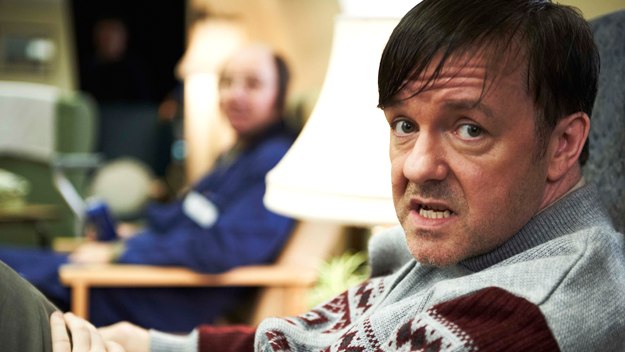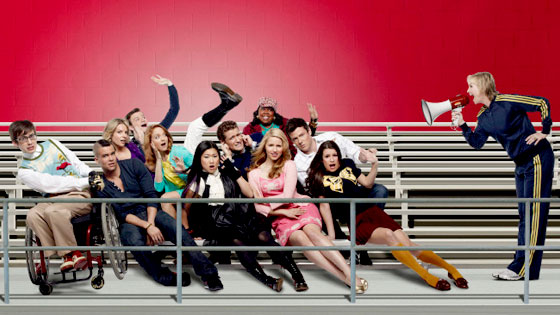But why am I mentioning her disability before her (really rather good) voice, you ask? Well frankly, it was impossible to ignore, the show rammed it down our throats so much.
- Every video, every link, it was mentioned.
- I began to think her middle name was Inspirational. Andrea Inspirational Begley. What makes her inspirational over any of the other competitors? Could it be...maybe...nope. No idea. At all. /sarcasm
- In training videos, Andrea dressed pretty much like the other female competitors: skinny jeans, heels, fitted tops. This makes me suspect that the way she was styled for each show was not her own taste, and was possibly designed to elicit the "ahh" factor. While the other women were in short skirts and tight trousers, Andrea was wearing what I described one week as "my first grown up party dress, aged 12". And always, always the milk-bottle glasses, reminding us of her visual impairment, though I discovered on Google Images while finding pictures for this post that in fact she doesn't always wear them. This chimes with the infantilisation of disabled people, seen as permanently child-like, their every achievement seen as more praiseworthy than that of someone able-bodied.
- Andrea's coach on the show, Danny O'Donoghue, habitually referred to her as having "the voice of an angel". Andrea's voice is good, but I wouldn't characterise it as particularly angelic. (What does an angel sound like anyway?) Could this be an example of a disabled person being perceived as the eternal innocent? During one of her songs, the tangentially relevant My Immortal, the production even projected a pair of angel wings behind Andrea's shoulders. One (non-disabled) person on my Twitter timeline commented that Andrea was lucky to be blind: she couldn't see them.
So far, so irritating. This was when I made my big mistake. Immediately after the result was announced, I tweeted the following.
Tweeted in anger, I fully admit, and also in pique because my favourite, Leah McFall, hadn't won. But I thought the meaning was clear, specifically the use of the word "if". IF you voted for Andrea because you think she has a wonderful voice, that's cool. But IF you voted for her because she's disabled and brave and inspiring and aww, then...well, the tweet says it.
Twitter's a funny place, though. If you dare to express an opinion, there are quite a few people who won't actually bother to read it properly, and just attack you instead. I was called quite a variety of things, most of which I wouldn't repeat on here. My block button was red-hot.
But the interesting thing was that several of them said I was the first person to mention that Andrea was blind. Really? Had they been watching the same show I had? Some of what I've mentioned above is fairly subtle, I agree, but the show had been blatant in their mentions of her disability, from her audition on.
As had Andrea herself, in fact. Despite saying she wanted to be judged on her voice rather than her disability, she talked about it in nearly every video. Reality show contestants are always victims to the edit, of course, but editors can only take things out, not add them in.
So what conclusions can I draw from this? I could try not to have so many opinions...but I don't think that's going to happen any day soon. I definitely need not to engage with trolls, just to ignore and block them. I don't need the stress. But you know, isn't it kind of worrying how ingrained disablism is in our society, that people don't even notice something as obvious as this?
PS As I've finished typing this, there's been an interview with Andrea on BBC Breakfast News. First question. "Tell us about your sight?"
























